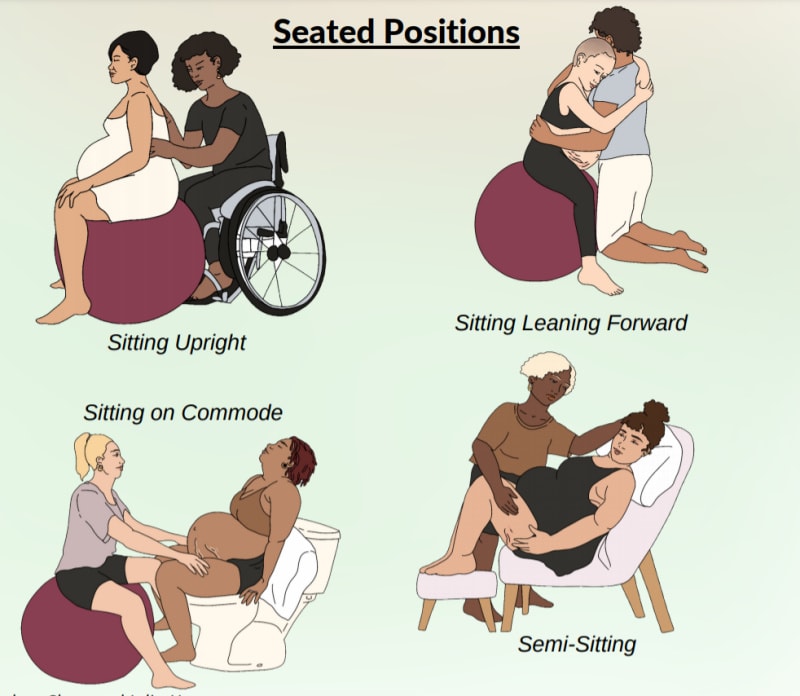
KJIPUKTUK (Halifax) – A new toolkit aims to educate and train doulas in 2SLGBTQ+ birthing people and their families, while also increasing the number of queer-identifying doulas in Nova Scotia.
About 20 people tuned into the 48-page Queer Doula Toolkit’s launch, held virtually via Zoom on Thursday evening.
The Queer Doula Toolkit was the brainchild of Clark MacIntosh, Queer Doula Coordinator at Wellness Within Nova Scotia, an organization for Health and Justice. The non-profit organization, founded and coordinated by activist nurse and decade-long doula, Martha Paynter, offers a queer doula training program. The illustrations were created by Julia Hutt and Audrey Chan. The toolkit is published by the Nova Scotia Public Interest Research Group (NSPIRG).
The project “aims to centre queer birth safety by contributing to queer birth education and increasing the number of queer-identified doulas in Nova Scotia,” according to Wellness Within.
The toolkit has 21 sections that range from 2SLGBTQ+ terminology and pronouns, to epidural positioning and understanding c-sections, in an effort to make the material as accessible as possible.
MacIntosh, who also serves as the Finance and Resource Centre Coordinator at NSPIRG, credits a Facebook post by an individual looking for a queer doula. The discourse in the comment section suggested a lack of queer-trained and queer-identified doulas as well as doulas looking for advice and guidance to better support their 2SLGBTQ+ clients.
“It really showed that there was a need for training, to create a space for more queer folks within the birthing care, but also that there’s a lot of folks who want to be able to provide better care to queer folks in birthing,” MacIntosh said.
That’s where the idea of the Toolkit was born.
Training opportunities this fall
The launch, moderated by Caitlin Hartlen, featured MacIntosh as a panelist, as well as Toolkit Content Coordinators Nicole Marcoux, and Jordan Roberts, who also serves as the Sexualized Violence Prevention and Response Officer at the University of King’s College.
“It’s lovely to see the way that this turned into a lot of heart and such a community effort, even though it was during the pandemic and most of us couldn’t see each other in person,” MacIntosh said at the launch. “It feels like a lot of love.”
Wellness Within teamed up with NSPIRG and The Tegan and Sara Foundation to explore what barriers expecting queer parents face in birthing care, where supports are lacking, and expand education around the safety and supports needed for queer births.
“They [Tegan and Sara] were really, really excited about partnering with us,” MacIntosh said. “They gave us a grant not only to do the toolkit itself, but also they’ve given us a second grant to create a training specifically for BIPOC queer folks.”
That training will take place this fall over three weekends in a virtual capacity. MacIntosh hopes to open training to all queer folks in October.
Part of the toolkit is a birth plan that doulas can share to any medical professional to preserve bodily autonomy and create an open platform of communication for doulas to advocate on the behalf of their client.
Also included in the toolkit are sections on advocating in health care systems, strategies for working through anxiety and triggers, and coping and support strategies, all factors that can cause alienation to queer folks in medical institutions.
MacIntosh believes the government should provide more support for queer-birthing folks, but adds that training can’t happen without acknowledging and understanding the role gender-based violence plays in the medical system.
“There’s definitely a lot of pushback from government when you’re trying to go in and deconstruct the way that societal structures operate,” MacIntosh explained. “So when we’re trying to really push the healthcare system to deconstruct their ideas of what the family looks like, to deconstruct their language, to deconstruct the racist underpinnings and this essential, and often heteronormative underpinning.”
The majority of education and training for doulas is both ciscentric and heteronormative. This creates barriers, a lack of confidence, and alienation for queer folks planning for parenthood.
“Especially in the more rural areas, it’s been very difficult to connect people with doulas that they feel comfortable with,” MacIntosh said.
Toolkit already circulating around the world
MacIntosh hopes the toolkit will one day become available in hospitals and doctors offices across the country.
“We’ve already connected with folks like the Toronto Birth Centre, the volunteer program here in Halifax and all sorts of places across Canada,” MacIntosh said. “Internationally, there’s been a huge uptake in both Texas and the United Kingdom with the toolkit already, so we’re just fostering those relationships and seeing how far we can spread this.”
“We had feedback from doctors and nurses and geniologists coming in and giving us some input into this,” MacIntosh said at the launch, “but we also had just plenty of folks in the queer community that gave us some insight into resources that they would need and experiences that they’ve had.”
MacIntosh and Paynter have trained between 40 and 50 doulas in their queer training program, with another dozen currently enrolled for training.
Wellness Within, which launched in 2012, is a registered nonprofit organization here in Nova Scotia working to advance sexual and reproductive health and rights for people experiencing criminalization and incarceration.
See also: Pregnancies don’t wait. Doula support withheld from pregnant inmates at Nova Institution
Check out our new community calendar!
With a special thanks to our generous donors who make publication of the Nova Scotia Advocate possible.
Subscribe to the Nova Scotia Advocate weekly digest and never miss an article again. It’s free!



